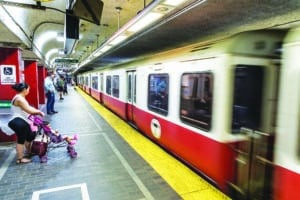Crushing traffic has returned to Massachusetts roadways after a pandemic lull, the MBTA faces warnings of a “fiscal calamity” by 2025 and the Baker administration’s keystone plan to cut greenhouse gas emissions from the transportation sector is dead.
But Senate leaders have gone more than three months without delegating a lawmaker to lead the chamber’s work on addressing these problems.
Senate President Karen Spilka has neither named a new Senate chair to the Transportation Committee nor outlined a timeline for doing so since the most recent person to hold that title, former Sen. Joe Boncore, resigned on Sept. 10.
A spokesperson told the News Service that Spilka still has not decided whether she will officially tap a senator to head up the committee or if Sen. John Keenan, a Quincy Democrat who serves as its vice chair, will continue to handle leadership duties.
Keenan said he is now working “more closely” with the committee’s House chair, Rep. William Straus, “to ensure that the Joint Committee on Transportation continues to process the 361 important bills under its jurisdiction.”
“I have been busy reviewing the bills, chairing hearings, meeting with advocates, and working with committee members, legislators, and the Administration to ensure that the local and broader transportation infrastructure needs and goals of the Commonwealth are met,” Keenan said in a statement.
For Straus, the current setup mirrors the committee’s work after former Transportation Committee Co-chair Sen. Tom McGee resigned in January 2018 to become mayor of Lynn. In that case, though, Acting Senate President Harriette Chandler selected Boncore as the panel’s next leader within weeks of McGee’s departure.
Spilka Rejects Funding Needs
While the Joint Committee on Transportation’s faces a hefty stack of bills to wade through, it faces a possibly more challenging problem, one its members have left mostly untouched this session: new revenues to boost funding for the state’s sometimes unreliable public transit systems and aging highway infrastructure.
Debate on that topic dominated Beacon Hill in late 2019 and the House approved a sweeping package in March 2020 that would have increased the state’s gas tax, corporate minimum excise tax, and fees on ride-hailing services such as Uber and Lyft.
The Senate allowed that proposal, which House Democrats projected would bring in more than half a billion dollars per year, to die without a vote after COVID-19 took over nearly all attention on Beacon Hill. Since then, neither branch has revived interest in the issue.
“We just did a $16 billion bond authorization,” Spilka said in September, referring to a transportation borrowing bill that did become law. “I’m not certain that there is the capacity to do more. $16 billion is larger than, if I remember correctly, any one appropriation by the Legislature. So I’m not certain that there’s a need for even more money. I have not heard that from a single person.”
The conservative Massachusetts Taxpayers Foundation issued a report in September warning that the T’s operations budget was on course to a “fiscal calamity” by fiscal year 2025 if hundreds of millions of new dollars aren’t found by the spring of 2023. The gaps, the report said are due to ridership drops caused by the pandemic and working from home, and an ongoing structural deficit legislators have never fixed.
The authors of the study described the predicament facing public officials, including the next governor, as a “Hobbesian choice” between raising revenue or accepting service cuts “that will exacerbate inequities and derail the Greater Boston economy.”
The gap on the capital side is even larger, according to the business-backed think tank, with between $700 million and $800 million a year needed to finance the $13 billion in infrastructure repairs and maintenance and $7 billion in climate change investments that will be needed by 2031.
Voters are set in November 2022 to decide whether to impose a 4 percent surtax on household income above $1 million per year. That question’s text calls for the new revenue to go to transportation and education, though opponents contend the tax, if passed, would fund general government spending. And some transit advocates are doubtful any transit funding the tax generates can go to anything other than repair work, given the proposal’s specific wording.
Bills Stack Up with Deadline Near
Since Boncore departed for a high-paying lobbying job leading the Massachusetts Biotechnology Council, the Transportation Committee has held three hearings to air legislation under its purview.
The panel has advanced only a handful of major bills this session, including an annual road funding package and a proposal to require public transit agencies to offer free rides on statewide election days, the latter of which remains tied up in each branch’s Ways and Means Committee.
But at the halfway point of the two-year lawmaking session, and with the biennial deadline to make decisions on most bills 37 days away, the Transportation Committee has not acted to send other high-profile matters into the larger legislative arena.
A bill that would allow undocumented immigrants to acquire standard driver’s licenses (H.3456 / S.2289), which the panel advanced last session on a party-line 14-4 vote, remains unmoved this time around, as do Gov. Charlie Baker proposals dealing with seatbelt enforcement (H.3706) and drugged driving (H.4255) that received hearings.
Material from a previous State House News Service report on the MTF analysis of MBTA finances was included in this report.







